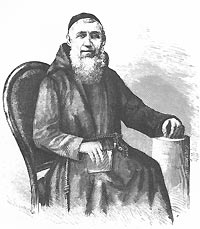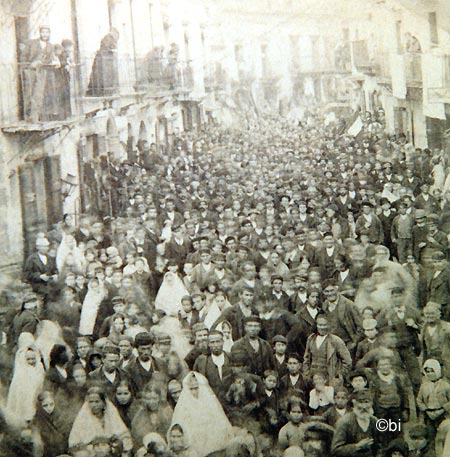Bronte's History
Revolutionary movements Bronte draws origin from a group of farmhouses (the ones unified by Carlo V order in 1535 were 24) populated by poor farmers and shepherds, always oppressed, object of abuses of every kind and perennially struggling for their existence. That is why his inhabitants preserved a strongly determinate nature, libertarian and seldom available to compromise, conscious and jealous of their rights, that, if required, can be claimed and get respected. Maybe not by chance the first man to talk about man's rights in Italy the philosopher Nicola Spedalieri, native of Bronte that was writing: "the more oppressed they are, the more they estimate themselves; and, the more they estimate, livelier is felt the wish for revenge". And of violated rights the brontese people had quite a lot. Centuries of exploitation, vassalage and misgovernment, secular quarrels between the poor Council and the Big and New Hospital in Palermo, first master of Bronte since 1491; struggles and judicial actions against the Horatio Nelson descendants (new masters since 1799, ready to defend their presumed rights and to claim new ones); Fights also against the tax collectors of Randazzo, which was retaining certain rights, with relative income, deriving from the ancient "mere and mixed empire". The opponent against whom to fight was often changing but the condition of vasallage and poverty of the brontese farmers was never changing. It is not by chance therefore that the brontese were also protagonists in good part of the Sicilian riots wanting to affirm the principles of autonomy and independence: from the rebellion against the Bourbon government of 1820, together with Palermo, that wished the restoration of the Sicilian constitution of 1812, to the risings of 1848-1849 (the year of the aborted revolutions for Italy) and, at last, to those of 1860 (more sadly famous) that obtained for Bronte the defamatory charge of "injured humanity", as hastily was declaring Nino Bixio, responsible creator of a massacre which choked in blood the yearning for freedom wished for centuries.
THE «GABELLE» (RURAL TAXES)
| Besides the famines, the malaria, plagues of every kind, Etna and the thieves which were infesting the countryside, the brontese folks, true vassals, were forced to submit also to several vexations and above all to the gabelle, imposed with strength from the various succeeding masters through the centuries. Here are some examples of eight gabelle still in force from 1500 to 1700 reported by Benedetto Radice in his "Memorie Storiche di Bronte" ("Bronte's historic memories"): (We report this in the original text almost impossible to translate) | | del macinato | "consiste che si paga da ogni persona che macina tarì 4 e grana 16 per ogni salma di frumento, orzo e segala" (un "grano" corrispondeva a lire 0,02 del 1862, un "tarì" a lire 0,42 ed un "onza" a lire 12,75) | | del salame | "consiste pagarsi tarì tre per ogni barile d'ogni cosa salata, tarì sei per ogni carico di pescame e tarì uno per ogni cantaro di formaggio, et tarì uno per ogni rotolo d'oglio ed altre minuzzerie" | | della carne | "consiste che si paga grana 2 per ogni rotolo" | | della panetteria | "consiste in zagato di non potere fare pane, nè altra cosa di pasta cotta nessuna persona senonchè li gabelloti e suoi sugabelloti con aggregazione di grana 10 per tùmino di formento" | | del maldenaro | "consiste di pagarsi tarì uno per salma, così del frumento che dell'orzo, ed altri ligumi, tarì uno per onza del bestiame che si bende, ed ogni altra cosa, così commestibile, come potabile, e dell'estrazione di ogni cosa, et uno per ogni libra di seta".
The tax was called "maldenaro" because hated by everyone. The icy snow that the Bronte people took in the summer from the slopes of Etna was also taxed and brought to Bronte "per ogni rotolo di neve, grana due"(for each roll of snow, two grain). | | del formaggio | "consiste di aversi a pagare per ogni persona che vende formaggio fuori il terriere tarì tre per cantaro (80 Kg.) e tarì uno grana dieci per ogni cantaro di ricotta" | | della caccia | "consiste di non potersi uscire nessuna sorte di caccia; aggregata a detta tabella tarì uno per ogni carico di pera s'estrae" | | della fogliame | "consiste d'avere a pagare d'ogni sorta d'ortaggio grana due per tarì" | | del mortigio | or mortizzi or primigie, imposed since 1616 on every family. It was levied directly by the City "to save the priest some repellent some wood". Even when he died there was no peace, death was taxed: the gabelle, in fact, was nothing but a forced contribution to the clergy for the burial of corpses and the accompaniment "vestiti di cotta" (clothes of crush) to the cemetery: "yes he paid tarì three for each fire, to have the right, after death, to be associated with the church "(only in April 1880 the City began to build the Cemetery).
The Gabella, hated by the people of Bronte, although abolished by King Ferdinand in 1781, continued to be levied for almost the entire 18th century. | Further to these, to better milk and shear the poor shepherds and peasants of Bronte, the fine minds of the fiscal officers had invented the tax on the plough (“five tari’ for every plough or perch”), that on the charcoal or fire wood, the customs duty (for imported goods), the exit duty ( for exported goods), the tax on the Zagato (monopoly rights to be able to sell cheeses, salami, oil or bread). On good holding (some sort of duty on the patrimony) and also the Collections, originally extraordinary taxes to be collected only in few cases (matrimonies of daughters or sisters of the king, coronations, invasions) but soon changed in ordinary taxes (were collected practically every year). In the end, not having anything more to tax, the salaries were forcibly reduced and eliminated expenses for public works. The poor Council, then, in addition to the "alms" that is to the contributions in cash and various kinds (meat, wheat, wood, coal) granted to the convents of the town on the occasion of feasts and religious celebrations, had to pay also «lo scasciato» (o scascio): a contribution paid to priests, clerics and deacons deemed by law to be privileged persons, not subject to paying taxes. And there were so many: think that in 1681 there were 47 priests, 5 deacons and 27 clerics on a population that did not exceed ten thousand.
"The table of accounts of 1681/82 - writes Vincenzo Pappalardo - shows how, with the "sscasciato" and alms, 13.9% of the municipal income was the prerogative of the clergy" (A feudal destiny in La Ducea di Bronte di A. Nelson Hood, Bronte, 2005). And - concluding with the B. Radice - «like the sixteenth century, so ended the seventeenth century: taxes, taxes, taxes; no public works: no roads, no water and the people paid. The Spaniards could not do anything but milk and shear first and secondhand. One can repeat the epigram that Francesco Longano recalls during his trip to Molise and Capitanata: Se tosan un po’ più le pecorelle
Gli uomini in breve si potran dipingere
Non senza panni no, ma senza pelle.» (If you're a little more worried about the sheep / Men will soon be able to paint / Not without cloths, but withou) |
|
|
A short history of Bronte
The 1820 revolution In the month of July of 1820 in Nola a military insurrection burst out and widened from country to country to reach even Bronte, that had remained then to the margins to look. Ferdinand I° of the Two Sicily, pushed by the events, granted the Constitution Of Spain. In Palermo, the governor promised that also in Sicily, as part of the kingdom, there would be some political concessions. To the praise of the few joined hostile shouts, waving tricolor cockades and yellow ribbons, this last symbol of the autonomy. The eastern Sicily was accepting the liberal constitution already in place to Naples and was therefore lining up against Palermo that, wishing to monopolize the political power, because forgotten by the Government In Naples, was shouting for autonomy and independence, invoking also the English inspired Sicilian constitution of 1812. Bronte depended to Catania (supportive of Naples) and to the near Adernò, center of military operations of the Principe della Catena, from whom were arriving continuous threats.
In Bronte the "baronelli" (the feudatories) were faithful to the Bourbon as was also the clergy, which was holding finance and culture. That applies also to the "ducal ones", since they were managing and conditioning the Town Council. The mayor Gioacchino Spedalieri, was trying neutrality while playing for time, receiving emissaries both from Palermo and from Catania, now with tricolor and yellow bands, now with bands of other colors. Between the brontese mass was winding a certain hope and freedom anxiety above all the wish to shake off the yoke of restriction and poverty caused, on their skin, by the "ducal authorities", with feudal methods. From Catania were sent Government forces which took position on the hill San Marco and began to go all over the countryside and up to the periphery of the town. They committed sacks, continuous raids and violences of every kind: many brontese chaps were imprisonned, men and women; one of the women who got killed was pregnant, and two ten years old girls were raped and one of them died. In the end the brontese people, exasperated, armed themselves and started to protest, shouting "long live Palermo!, Long live Santa Rosalia!", and raised the Palermo flag. The fight was violent and bloody, however the Bourbon were forced to retreat with heavy losses. With the arrival of the General Pepe and the capitulation of Palermo on (October 5) also Bronte waved white flag. The 29 of the same month the representatives of the Council swore for the Constitution Of Naples, even if with the intent to repudiate their oath as soon as possible. |
|  A description of the riots of 1820, told by Gesualdo De Luca, then only six year old, rummaging in his memory: A description of the riots of 1820, told by Gesualdo De Luca, then only six year old, rummaging in his memory:
(We report this in the original text almost impossible to translate) «Era scura la notte, e catellon catelloni popolani e campagnoli si appressarono al campo nemico, e si postarono dietro muriccioli a tiro di fucili.
L'alba non era fatta, micidiali rimbombi e la cupa luce della scarica dei fucili destavano l’attenzione ed il timore, proprii del caso.
Io ero stato dai miei condotto in un palmento del Corvo, e palpitante scappai a guardare. Schiarito il giorno, il fuoco si fece più vivo.» I regi governativi, circondati da più parti, si sbandarono nelle vicine sciare: «…infelici non potevano correre, raggiunti dai vittoriosi, correnti come daini, erano trucidati». I popolani «…fecero ritorno al paese, portando infilzate ai fucili quattro teste dei nemici, che …deposero sulla piazza.» Soon after noon everything was over. |
|
|
 A description of the riots of 1820, told by
A description of the riots of 1820, told by 
